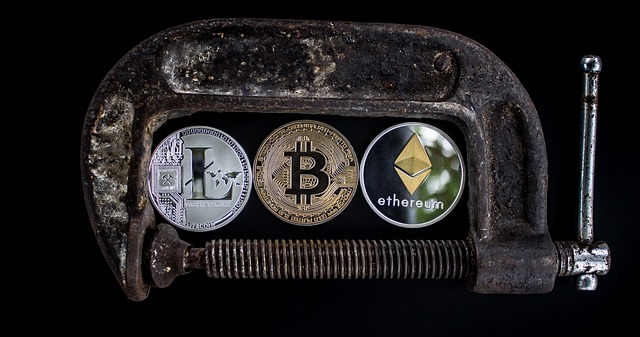Crypto and DeFi: The Future of Digital Finance
Crypto and DeFi: The Future of Digital Finance

The Rise of Digital Currencies: Exploring the Evolution of Finance
Digital currencies have been steadily gaining momentum and revolutionizing the traditional financial landscape. With the rise of cryptocurrencies like Bitcoin and Ethereum, the way we perceive and engage with money is undergoing a transformative shift. This evolution is largely credited to the underlying technology behind these currencies—blockchain.
Blockchain technology serves as the foundation of digital currencies, enabling secure, transparent, and immutable transactions. Unlike traditional financial systems that rely on centralized institutions like banks, digital currencies operate on a decentralized network, eliminating the need for intermediaries. This decentralization has several advantages, including faster and more efficient transactions, reduced fees, and increased accessibility for individuals around the world. As the popularity of digital currencies continues to grow, it is clear that they are reshaping the way we think about finance and are poised to play a significant role in the future of the global economy.
Decentralized Finance: A Paradigm Shift in the Financial Industry
Decentralized Finance, also known as DeFi, has been making waves in the financial industry, transforming the way we think about traditional banking and financial services. With the advent of blockchain technology and smart contracts, DeFi offers an alternative to the centralized systems that have dominated the industry for centuries. It provides individuals with greater control over their finances, eliminating the need for intermediaries such as banks or other financial institutions.
One of the key advantages of DeFi is its ability to foster financial inclusion. Traditional banking services often come with high fees, stringent eligibility criteria, and limited accessibility, leaving millions of people underserved. However, DeFi platforms enable anyone with an internet connection to access a wide range of financial services, from lending and insurance to asset management and trading. By leveraging blockchain technology and open protocols, DeFi is able to provide financial services to the unbanked and underbanked populations around the world, empowering them to participate in the global economy like never before.
• DeFi allows individuals to have greater control over their finances
• It eliminates the need for intermediaries such as banks or financial institutions
• Traditional banking services often come with high fees and limited accessibility
• DeFi platforms enable anyone with an internet connection to access a wide range of financial services
• These services include lending, insurance, asset management, and trading
• Blockchain technology and open protocols are leveraged by DeFi to provide financial services globally
• Financial inclusion is fostered by DeFi, empowering the unbanked and underbanked populations
Understanding Blockchain Technology: The Foundation of Crypto and DeFi
Blockchain technology is at the core of the crypto and decentralized finance (DeFi) revolution.

With the rise of blockchain technology, cryptocurrencies were born. Cryptocurrencies are digital or virtual currencies that utilize cryptography for secure and efficient financial transactions. They leverage blockchain technology to enable peer-to-peer transfers without the need for any centralized authority. This decentralized nature of cryptocurrencies eliminates the need for traditional banks, making financial transactions faster and more accessible. It also opens up new opportunities for individuals to participate in financial systems, especially those who are unbanked or underbanked. The revolution brought forth by blockchain technology has the potential to reshape the entire financial ecosystem and empower individuals around the world.
Smart Contracts: Revolutionizing How Financial Transactions are Executed
Smart contracts are rapidly transforming the way financial transactions are executed in various industries. Unlike traditional contracts that require intermediaries such as lawyers or banks, smart contracts are self-executing agreements written in code, stored on a blockchain, and automatically executed when pre-defined conditions are met. This eliminates the need for intermediaries, reduces costs, and minimizes the potential for errors or fraud.
One of the key advantages of smart contracts is their efficiency. By automating the execution of transactions, smart contracts streamline the entire process, reducing the time and effort required from all parties involved. For instance, in real estate, smart contracts can automate the transfer of property ownership, eliminating the need for lengthy paperwork and multiple intermediaries. Similarly, in supply chain management, smart contracts can automatically trigger payment once goods reach the specified destination, ensuring prompt transactions and reducing delays. With its ability to revolutionize transaction execution, it is no wonder that smart contracts are gaining significant attention in the financial industry.
Exploring the Advantages of Decentralization in Financial Systems
Decentralization in financial systems has emerged as a game-changer, bringing forth numerous advantages that were previously unimaginable. One of the key advantages is the removal of intermediaries, such as banks or financial institutions, from the equation. This means that individuals can directly transact with each other, eliminating the need for third-party involvement and reducing associated costs. By cutting out the middlemen, decentralization promotes greater efficiency and faster transaction speeds.
Moreover, decentralization offers enhanced security and privacy. With traditional financial systems, personal information is often stored in centralized databases, making it vulnerable to hacking and unauthorized access. In contrast, decentralized systems utilize cutting-edge blockchain technology to ensure data integrity and protect user identities. The transparency and immutability of blockchain minimize the risk of fraud and provide individuals with greater control over their financial information. Furthermore, transactions conducted on decentralized platforms are pseudonymous, offering users an additional layer of privacy. With these advantages in mind, it’s no wonder that decentralization is increasingly being seen as a viable alternative to traditional financial systems.
The Role of Cryptocurrencies in Financial Inclusion and Empowerment
Cryptocurrencies have emerged as a powerful tool for promoting financial inclusion and empowerment. Traditional financial systems often exclude individuals who lack access to banks or those living in remote areas. However, cryptocurrencies provide an alternative means of accessing financial services and participating in the global economy. With just a smartphone and an internet connection, people can now send and receive money, access credit, and engage in economic activities without the need for a traditional bank account.

One of the key features of cryptocurrencies that contribute to financial inclusion is their decentralized nature. Unlike traditional banking systems, which rely on centralized authorities to facilitate transactions, cryptocurrencies operate on blockchain technology. This means that transactions are verified and recorded by a network of computers, eliminating the need for intermediaries. As a result, individuals can send and receive funds directly from anywhere in the world, regardless of their location or the presence of a banking infrastructure. This decentralized approach not only promotes inclusivity but also reduces transaction costs, making financial services more affordable and accessible to a wider range of individuals.
The Potential Risks and Challenges of Crypto and DeFi
Cryptocurrencies and decentralized finance (DeFi) have rapidly gained popularity in recent years, but it’s essential to understand the potential risks and challenges that come with this new and evolving technology. One significant concern is the volatility of cryptocurrencies. Prices can fluctuate wildly, leading to substantial losses for investors who are not cautious. The lack of regulation in the crypto market also exposes investors to fraud and scams, as there are no strict guidelines to protect them.
Another challenge is the complexity and technicality of the blockchain technology that underpins cryptocurrencies and DeFi. Many individuals may find it challenging to comprehend the intricate workings of this technology, leading to a lack of understanding of the risks involved. Additionally, the decentralized nature of these systems means that there is no central authority or institution to turn to for assistance in case of issues or disputes. This lack of centralized oversight can make it difficult to resolve problems and may discourage those who require a more traditional support system.
Liquidity Pooling: How It Facilitates Faster and Cheaper Transactions
Liquidity pooling has emerged as a key mechanism in digital finance, enabling faster and cheaper transactions. In traditional financial markets, liquidity refers to the ease with which an asset can be bought or sold without causing significant price changes. Similarly, in the world of cryptocurrencies and decentralized finance (DeFi), liquidity is crucial for efficient trading.
By pooling together the resources of multiple participants, liquidity pooling platforms ensure that there is a constant supply of assets available for trading. This is achieved by individuals depositing their assets, such as cryptocurrencies, into a liquidity pool. In return, they receive liquidity provider tokens that represent their share in the pool. These tokens can be redeemed at any time by the liquidity providers, allowing them to withdraw their assets. This pooling mechanism not only increases the overall liquidity but also enables faster transactions as buyers and sellers can easily match their orders within the pool. Additionally, liquidity pooling reduces transaction costs by eliminating the need for intermediaries and lowering the impact of market slippage. As a result, participants can enjoy faster and cheaper transactions, making digital finance more accessible and efficient for all.
The Role of Stablecoins in Mitigating Volatility in Crypto Markets
Cryptocurrencies are known for their extreme volatility, with wild price swings that can happen within minutes. This volatility, while exciting for some investors, can be a major deterrent for widespread adoption and use of digital currencies. Stablecoins have emerged as a potential solution to this problem. Unlike other cryptocurrencies, stablecoins are designed to have a stable value, often pegged to a fiat currency such as the US dollar. This stability makes stablecoins a reliable store of value and a trusted medium of exchange within the volatile crypto markets.
One of the key benefits of stablecoins is their ability to mitigate volatility in crypto markets. By providing a price stability that other cryptocurrencies lack, stablecoins offer users a consistent and predictable value for their digital assets. This is particularly important for traders and merchants who rely on stable prices to conduct business and make accurate financial decisions. Additionally, stablecoins can act as a bridge between traditional financial systems and the world of cryptocurrencies, facilitating easier and more seamless transactions. With stablecoins, users can enjoy the benefits of cryptocurrencies while avoiding the risks associated with price fluctuations.
The Future of Digital Finance: Innovation and Disruption
Innovation and disruption have always been at the core of the financial industry. However, with the rise of digital finance, these concepts have taken on a whole new meaning. The future of digital finance is characterized by a constant push for groundbreaking ideas and technologies that can transform the way we manage, invest, and transact in the world of finance.
One of the key drivers of innovation in digital finance is the seamless integration of emerging technologies, such as blockchain and artificial intelligence. These technologies have the potential to revolutionize not only how financial transactions are executed but also how data is stored, analyzed, and utilized. By leveraging blockchain technology, for example, financial institutions can enhance security, transparency, and efficiency in their operations, while artificial intelligence can enable more personalized and automated financial services. As the landscape of digital finance continues to evolve, the possibilities for innovation and disruption are infinite, promising a future where financial services are more accessible, efficient, and tailored to individual needs.
What is digital finance?
Digital finance refers to the integration of technology and financial services, allowing for the management and transfer of funds digitally. It encompasses various aspects such as digital currencies, decentralized finance (DeFi), and blockchain technology.
What are digital currencies?
Digital currencies, also known as cryptocurrencies, are virtual or digital assets that utilize cryptography for secure financial transactions. They operate independently of central banks and traditional financial institutions.
What is decentralized finance (DeFi)?
DeFi is a new paradigm in the financial industry that aims to decentralize traditional financial systems. It utilizes blockchain technology and smart contracts to remove intermediaries and provide open, transparent, and permissionless financial services to users.
How does blockchain technology contribute to digital finance?
Blockchain technology is the foundation of cryptocurrencies and DeFi. It is a decentralized and transparent ledger that records all transactions across a network of computers. This technology ensures security, immutability, and efficiency in financial transactions.
What are smart contracts?
Smart contracts are self-executing digital contracts that automatically enforce the terms and conditions agreed upon by parties.

What are the advantages of decentralization in financial systems?
Decentralization in financial systems eliminates the need for intermediaries, reduces fees, enhances transparency, and provides greater financial inclusivity. It empowers individuals by giving them control over their funds and allows for innovation and access to financial services for underserved populations.
How do cryptocurrencies contribute to financial inclusion and empowerment?
Cryptocurrencies provide financial inclusion by enabling individuals without access to traditional banking services to participate in the global economy. They empower individuals by giving them full control over their funds, facilitating remittances, and enabling access to financial services without the need for a traditional bank account.
What are the potential risks and challenges of cryptocurrencies and DeFi?
Cryptocurrencies and DeFi face challenges such as regulatory uncertainty, market volatility, security risks, and potential for fraudulent activities. Additionally, the adoption and integration of these technologies into existing financial systems may pose challenges for traditional institutions.
How does liquidity pooling facilitate faster and cheaper transactions?
Liquidity pooling is a mechanism in DeFi that allows users to pool their funds together, providing liquidity for decentralized exchanges and lending platforms. This ensures there are enough funds for transactions, reducing slippage and transaction costs, while also enabling faster and more efficient trades.
What role do stablecoins play in mitigating volatility in crypto markets?
Stablecoins are cryptocurrencies that are pegged to a stable asset, usually a fiat currency like the US dollar. They provide stability in crypto markets by minimizing the effects of volatility. This allows users to hedge against market fluctuations and use stablecoins as a reliable store of value and medium of exchange.
What does the future hold for digital finance in terms of innovation and disruption?
The future of digital finance holds immense potential for innovation and disruption. We can expect advancements in areas such as cross-border payments, asset tokenization, decentralized lending and borrowing, and the integration of artificial intelligence and machine learning in financial services. These innovations have the potential to reshape the financial landscape and provide increased accessibility, efficiency, and financial empowerment for individuals globally.
Todays Featured Product:
Buy, exchange and grow your crypto securely with a Ledger hardware wallet, combined with the Ledger Live app. It’s never been easier to keep your crypto safe and accessible. Buy direct from Ledger.com and get todays Special Offers Here.




